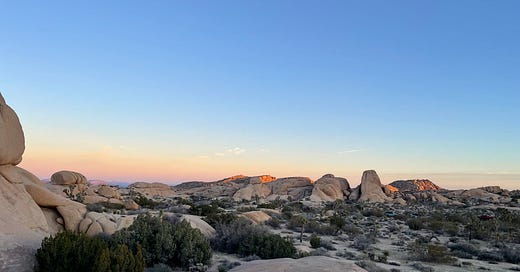I started this Substack a year ago today, Earth Day 2023.
I was an ecology grad student, dismayed by the fact that it took me 6 years of education to learn seemingly fundamental information about our environment.
In theory, everyone has access to data about climate change, biodiversity loss, fossil fuel consumption, microplastics, invasive species, etc., etc. On social media, I frequently see people telling each other “Google exists” when they ask questions about social and environmental issues.
But how would they know where to start? I took classes with graduate students in other fields who were floored by some of the climate statistics I heard every day. A business student had just learned the term “biodiversity” that year.
I feel that if I have the privilege of this knowledge, I also have to obligation to make it more accessible. It’s too important not to share.
That’s why Earth Day felt like the perfect day to start posting about ecology and environmental science.
Earth Day is the day when people are primed to learn about our planet, to commit to making changes in their everyday lives, to get angry at those who disrespect and disregard the environment.
In 1970, Earth Day started as a gathering of support for our environment, a demonstration against industrial development, pollution, and several catastrophic oil spills. Created by Senator Gaylord Nelson and graduate student Denis Hayes, the first Earth Day inspired more than 20 million Americans (10% of the population at the time) to call for environmental action.
And it worked. That same year, Congress created the Environmental Protection Agency (EPA) and passed the Clean Air Act. The Clean Water Act followed closely in 1972. Earth Day was a turning point for public and governmental opinion about the environment.
It quickly became a global phenomenon. In 1990, Denis Hayes reprised his role and organized the first global Earth Day. More than 200 million people in 141 countries participated in Earth Day demonstrations and activities.
Since then, Earth Day has been a staple. More than a billion people participate every year and I remember celebrating each April as a little kid. We would always plant a tree or learn how to recycle or watch a nature documentary (often narrated by David Attenborough).
It was special, and I remember feeling so inspired to do whatever I could to help Mother Earth.
Maybe it’s because I’m older or maybe because the grim realities of climate change have become clear, but I don’t sense the same passion or excitement for Earth Day anymore. It’s like everyone is too pessimistic.
I understand. It’s easy to feel helpless when environmental catastrophe looms closer and closer, when the people with the money and power don’t give a damn what happens to our planet as long as they keep getting money and power.
But I think that makes Earth Day more important than ever.
In 2024, our planet will face more serious threats than ever before. There’s a 55% chance it will be the warmest year on record, a 99% chance it will be in the top 5.
Last year, the U.S. Supreme Court removed protections from most of the nation’s wetlands (some of the most valuable ecosystems), and ruled that the Clean Air Act cannot be used to limit emissions from power plants, gutting the power from a law that Earth Day 1970 fought so hard for. We will certainly see the effects of those decisions this year.
These are daunting stats, but don’t get demoralized. We are not past the point of no return.
Already this year, the U.S. has banned harmful chemicals from drinking water, which could prevent thousands of illnesses. And overseas, the European Court of Human Rights ruled that government inaction on climate change violates basic rights.
There are more and more lawsuits filed against oil companies – including one by the state of California – attempting to hold Big Oil accountable for lying about the effects of fossil fuel emissions.
There are so many things to be optimistic about, so many things to fight for.
Times may have changed since Earth Day 1970, but the overarching sentiment is the same. We want a world where the planet is prioritized, with less fossil fuels, less pollution, less leniency for those who cause harm.
And even if you’re not participating today, there are so many things you can do for the Earth every day. I’ve written about them before and I probably will again, but read, learn, limit your consumption, vote, protest, spend time outside.
One thing I’ll continue to do for the Earth is write. It’s a relatively minor thing, but I don’t think that makes it unimportant. If even one person is inspired to engage more with climate activism, with environmental science, with ecology, then it’s worth it to me.
In 1970, the first Earth Day was established by a grad student who cared deeply about the environment, who wanted to protect it. 53 years later, on Earth Day 2023, another grad student (me), was inspired to take action for the environment, to help protect it.
everyday environmentalism is much smaller and quieter than a nationwide demonstration, but I can’t help but make the comparison. This is my Earth Day.




If only the Biden administration thought about Earth Day a week and a half ago when they approved the largest offshore oil export terminal in history!